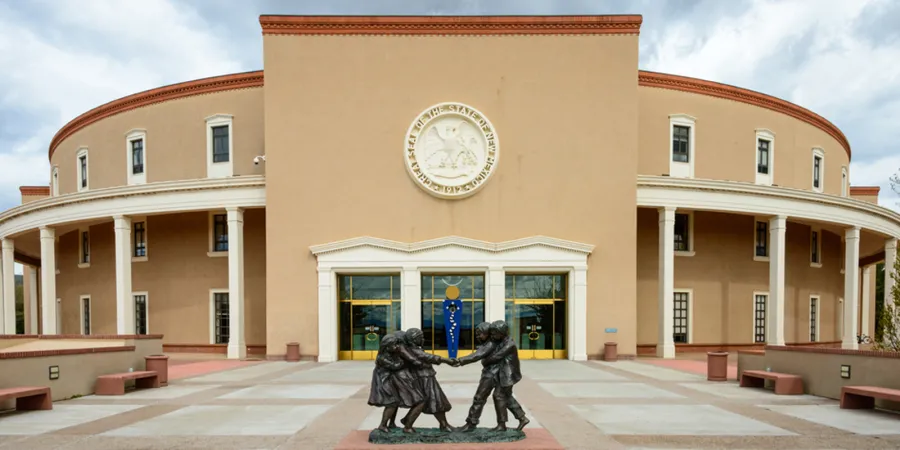AFSCME New Mexico members win on wages, staffing, public safety in legislative session

ALBUQUERQUE, N.M. – AFSCME members in New Mexico achieved significant victories for public service workers in the legislative session that ended on March 18.
Throughout the session, members of AFSCME Council 18 fought for their fellow union members and the public services they provide to keep New Mexico running.
Wages were at the top of the agenda after Gov. Michelle Lujan Grisham’s administration failed to reach agreement with Council 18 prior to the session. Instead, both parties elected to address wages through the legislative process.
The governor’s initial proposed budget contained just a 4% raise for all state and university employees.
When Cathy Townes of AFSCME Local 477 in Santa Fe heard about it, she said she was disenchanted.
“Our members have been through a lot these last few years with the pandemic, inflation, you name it. So I was a bit disappointed when I heard that the executive budget recommendation was only offering 4% initially,” Townes said.
But Townes didn’t let that stop her. She texted and called other members, encouraging them to email their legislators to explain the need for higher compensation.
“When we have an opportunity to speak to the legislators, we have to take advantage,” she said to other members. “We want their support to get things done for our members.”
The way Townes sees it, wages were such a crucially important issue because of staffing shortages across the state.
“COVID really socked it to us,” Townes said. “There are vacant positions in every department that our local represents. Pay is the easiest way we can make sure we are fully staffed up, which means a stronger local and better public services.”
Hard work done by Townes and countless others across the state paid off. In the last two weeks of the session, legislators agreed to increase raises to 6% for all state employees. Combined with fiscal year 2023’s raises ranging from 7% to 40% (and averaging well over 10%), almost all state and university employee raises will be well above inflation for this two-year period beginning July 1.
“It’s going to make a huge difference,” Cathy said.
Now, the budget awaits the governor’s signature.
AFSCME members didn’t stop there. Resolving the staffing crisis in state government was another big priority at a time many departments and agencies are experiencing vacancy rates of 30% or more.
One of AFSCME’s solutions was supporting the creation of a law enforcement retention fund at the local level to help recruit and retain police, sheriffs, public defenders, district attorneys and county corrections officers (with some related funding for state corrections programming). AFSCME members got more than $36 million in initial funding for this program; the money can be used for relocation, recruiting bonuses, retention bonuses, training and other recruiting and retention campaigns.
On the state level, AFCSCME members helped support legislation seeking a job classification and compensation study before the 2024 legislative session. This proposal is just the first step to ensuring public state employees are being paid competitive wages for the public services they provide.
AFSCME members working in New Mexico corrections facilities also raised concerns about a well-intentioned bill that would have put staff and inmates at risk. The measure would have made it nearly impossible to remove inmates from dangerous situations by placing excessive regulations on restrictive housing practices. For instance, the measure would have mandated that inmates be at least 21 years old before they could be housed separately from the general population.
According to Joseph Trujeque of Local 2499 in Bernalillo County, that would have been “the No. 1 most unsafe thing to happen in corrections today.”
Often, individuals are placed in restrictive housing when they are a danger to others, but also when officers deem it necessary to remove someone to protect them from violence from the general population. This bill would have removed that essential tool for creating a safe environment. Not only was it potentially unsafe, but downright impossible to achieve given staffing shortages in New Mexico corrections.
“Across the entire country, not just New Mexico, we are suffering staff shortages in corrections,” Trujeque said. “With the ... almost 50% vacancy rate, it would be just impossible to accomplish this bill’s goal.”
After legislators heard from AFSCME members, the bill stalled in the House.
“Had this bill passed, it had the potential to really cripple the corrections society. Especially because of the short staffing right now,” said Trujeque.
[caption caption="Connie Derr" align="right"]
Members also helped pass legislation that protects city and county revenue, prevents pension double-dipping, halts state privatization, and protects voting rights. It was a strong showing that demonstrates the importance of having a union voice at the table in politics.
Connie Derr, executive director of Council 18 and an AFSCME vice president, emphasized the importance of working people participating in the legislative process.
“Our elected officials need to hear from the front-line staff making sure the state, cities and counties run. It’s how we make sure that we can advocate not just for our job conditions, but for the public services we provide. We must always keep our foot on the gas, 365 days of the year,” Derr said. “If our voice isn’t heard, it won’t be considered.”
